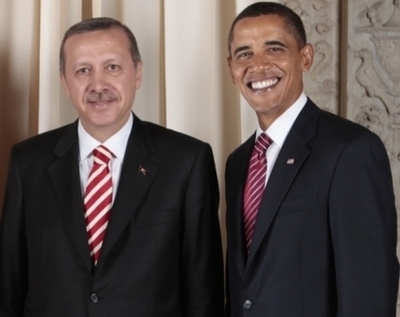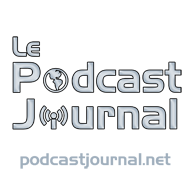
Powerful...with back-up! Official White House. Photo (C) Lawrence Jackson.
Perhaps the winning of this last mandate was further powered by the stance of Erdogan with the right of Arab people for freedom from dictators and their inhumane oppression.
Recep Tayyip Erdogan was able to convince at least 50% of the Turkish population to re-elect him in spite of the tension with the Kurds on one hand and the weakening of the economic power of a giant in the Middle-Eastern economy.
If we are to consider that the results of the latest elections reflect on a major change in the Turkish position within the Middle-East, the political role of Turkey during the current Arab-world insurrections and after will most probably be highly significant.
Turkey has learned from its very long experience of its ancestral Ottoman empire’s reign over Arabic speaking countries. Cultural exchange went very deep and widely varied ranging from music to language to politics. During that period, the Turkish language was written with Arabic characters which further eased the altercation. Despite the sudden move to the Latin characters, the 300 year-old Ottoman reign created an unbreakable bond between Turkey and the neighboring Arabic speaking countries.
Geography has laid the basis of the relations between Turkey and Syria in politics and within the market. This same geography created the necessary ground to allow the change in the Turkish prime minister’s position from his neighboring regime. The arrival of about ten thousand Syrian refugees in Turkey running from the current security difficulties and the deteriorating situation in Syria is a major humanitarian pressure which caused immediate action from Erdogan. He lately sent his final recommendations to the Syrian president Bashar Al Assad giving him a week for a last chance to apply real actions rather than just words in the rectifications in Syria.
On the other hand, the other non-Arabic-speaking country of the Middle-East is on opposite terms with the current Turkish position from Syria. Iran of Ahmedi Najad, on bad terms with the western world, considered the axis of evil by the United States of America, is standing with the Syrian regime and covering it with all possible resources. This military leviathan is constantly building its own weapons. It is even said that Iran has utilized the expertise of North Korea in nuclear weapons to start building an arsenal of mass destruction.
Knowing that the United States has military bases in Turkey since the cold war, and based on the close relations with the USA which is putting all the necessary weight to ensure the entry of Turkey into the European Union, will Turkey proceed to establish a counter force against Iran in the region now that Erdogan has started to change position from the stance with the Syrian regime (the Middle-Eastern ally of Iran) to an opposing attitude?
Just by thinking of possible scenarios, the equation seems very complex on many levels and in a multitude of domains. However, keeping the previous situation of “benevolent neutrality” between the two non-Arabic speaking countries of the Middle-East in current occurrences is no longer plausible.
Let’s wait, therefore, and see.
Recep Tayyip Erdogan was able to convince at least 50% of the Turkish population to re-elect him in spite of the tension with the Kurds on one hand and the weakening of the economic power of a giant in the Middle-Eastern economy.
If we are to consider that the results of the latest elections reflect on a major change in the Turkish position within the Middle-East, the political role of Turkey during the current Arab-world insurrections and after will most probably be highly significant.
Turkey has learned from its very long experience of its ancestral Ottoman empire’s reign over Arabic speaking countries. Cultural exchange went very deep and widely varied ranging from music to language to politics. During that period, the Turkish language was written with Arabic characters which further eased the altercation. Despite the sudden move to the Latin characters, the 300 year-old Ottoman reign created an unbreakable bond between Turkey and the neighboring Arabic speaking countries.
Geography has laid the basis of the relations between Turkey and Syria in politics and within the market. This same geography created the necessary ground to allow the change in the Turkish prime minister’s position from his neighboring regime. The arrival of about ten thousand Syrian refugees in Turkey running from the current security difficulties and the deteriorating situation in Syria is a major humanitarian pressure which caused immediate action from Erdogan. He lately sent his final recommendations to the Syrian president Bashar Al Assad giving him a week for a last chance to apply real actions rather than just words in the rectifications in Syria.
On the other hand, the other non-Arabic-speaking country of the Middle-East is on opposite terms with the current Turkish position from Syria. Iran of Ahmedi Najad, on bad terms with the western world, considered the axis of evil by the United States of America, is standing with the Syrian regime and covering it with all possible resources. This military leviathan is constantly building its own weapons. It is even said that Iran has utilized the expertise of North Korea in nuclear weapons to start building an arsenal of mass destruction.
Knowing that the United States has military bases in Turkey since the cold war, and based on the close relations with the USA which is putting all the necessary weight to ensure the entry of Turkey into the European Union, will Turkey proceed to establish a counter force against Iran in the region now that Erdogan has started to change position from the stance with the Syrian regime (the Middle-Eastern ally of Iran) to an opposing attitude?
Just by thinking of possible scenarios, the equation seems very complex on many levels and in a multitude of domains. However, keeping the previous situation of “benevolent neutrality” between the two non-Arabic speaking countries of the Middle-East in current occurrences is no longer plausible.
Let’s wait, therefore, and see.










 Les dernières actus de Palestine
Les dernières actus de Palestine








